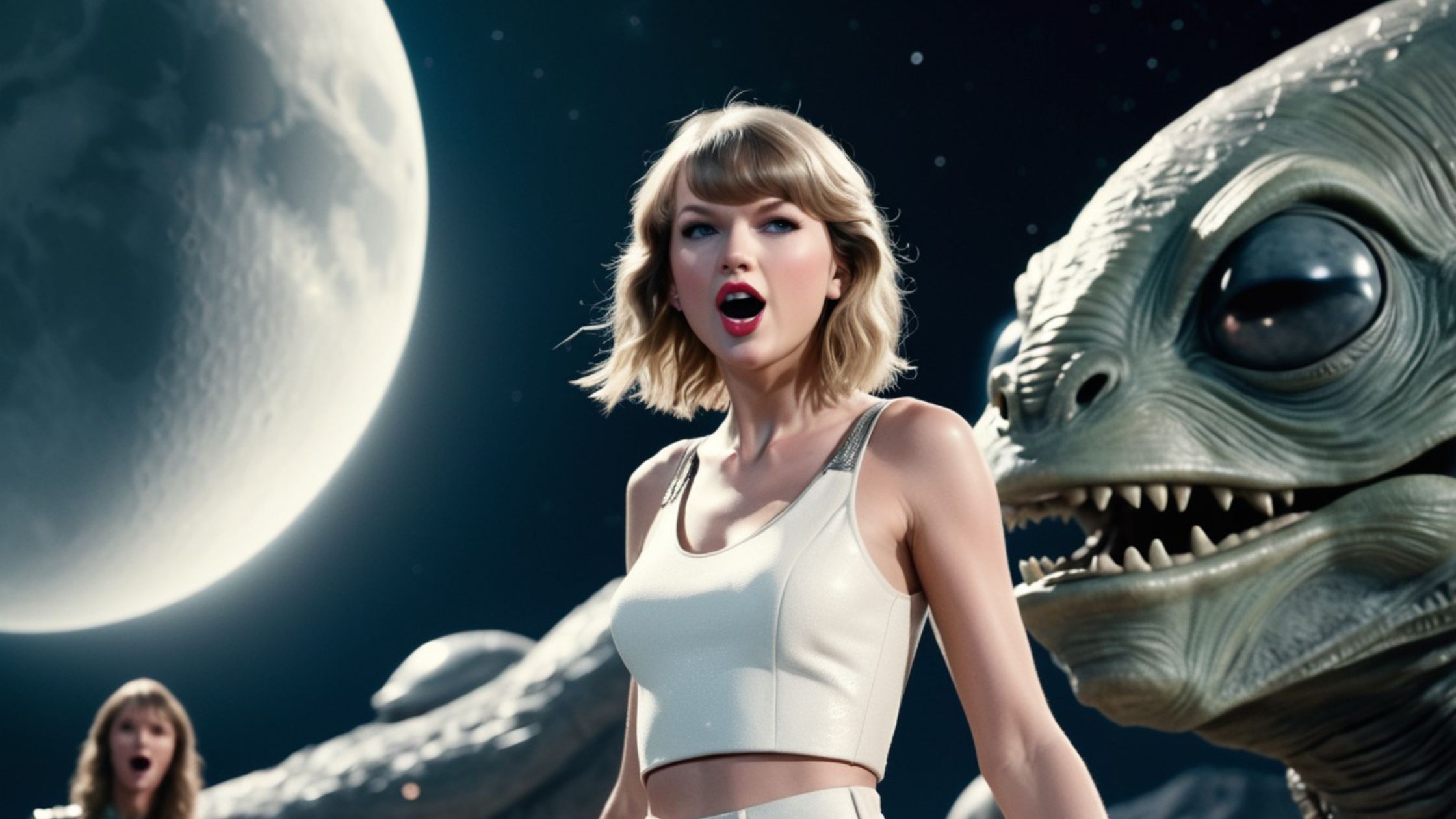Taylor Swift AI Photos Controversy: Understanding The Facts And Implications
In recent years, the rise of AI technology has sparked numerous controversies, including the emergence of AI-generated content involving celebrities like Taylor Swift. The term "Taylor Swift AI photos sex" has become a trending topic, raising concerns about privacy, consent, and the ethical implications of AI-generated imagery. As one of the most influential figures in the music industry, Taylor Swift's name being associated with this issue demands a closer examination of the facts surrounding this phenomenon.
The world of artificial intelligence has opened up new possibilities, but it has also introduced challenges that affect individuals from all walks of life. Celebrities, due to their public personas, often find themselves at the center of these debates. Taylor Swift, known for her immense talent and global fanbase, is no exception. This article aims to provide a comprehensive understanding of the issues surrounding AI-generated content and its impact on privacy and ethics.
As technology continues to evolve, it is crucial to address the implications of AI-generated imagery. This article will explore the facts, myths, and potential solutions to ensure that individuals, including celebrities like Taylor Swift, are protected from misuse of AI technology. By examining the legal, ethical, and societal aspects, we can better understand the broader implications of this growing trend.
Table of Contents
- Biography of Taylor Swift
- Overview of AI Technology
- Understanding AI-Generated Content
- Privacy Concerns in AI Photos
- Ethical Implications of AI Imagery
- Legal Aspects of AI-Generated Content
- Taylor Swift's Case in AI Controversy
- Prevention Measures Against Misuse
- Impact on the Entertainment Industry
- Future Directions for AI Technology
Biography of Taylor Swift
Taylor Swift, born on December 13, 1989, in Reading, Pennsylvania, is one of the most celebrated artists in the music industry. Her journey from a young singer-songwriter to a global icon has been marked by numerous achievements and accolades. Below is a summary of her key milestones:
Key Facts About Taylor Swift
| Full Name | Taylor Alison Swift |
|---|---|
| Date of Birth | December 13, 1989 |
| Place of Birth | Reading, Pennsylvania |
| Profession | Singer-Songwriter, Musician, Actress |
| Major Achievements | 12 Grammy Awards, Billboard Music Awards, and numerous other accolades |
Overview of AI Technology
Artificial intelligence (AI) refers to the simulation of human intelligence in machines that are programmed to think and learn like humans. AI technology has made significant advancements in recent years, impacting various industries, including entertainment, healthcare, and finance. One of the most notable applications of AI is in image generation, where algorithms can create realistic images based on input data.
AI-generated imagery has become increasingly sophisticated, raising questions about its ethical use. While AI has the potential to enhance creativity and innovation, it also poses risks when used irresponsibly. The misuse of AI-generated content, such as in the case of Taylor Swift AI photos, highlights the need for stricter regulations and guidelines.
Understanding AI-Generated Content
AI-generated content refers to images, videos, or audio created using artificial intelligence algorithms. These algorithms analyze vast amounts of data to produce outputs that mimic real-life scenarios. In the context of celebrities, AI-generated content can include photos or videos that appear to depict them in situations they have not consented to.
How AI Generates Content
- Deep learning algorithms process large datasets to understand patterns and features.
- Generative Adversarial Networks (GANs) are commonly used to create realistic images.
- AI models can be trained to replicate specific styles or appearances, such as those of celebrities.
Privacy Concerns in AI Photos
The use of AI to generate images of individuals, especially celebrities, raises significant privacy concerns. Celebrities like Taylor Swift have a right to control how their image is used, and unauthorized AI-generated content violates this right. The lack of consent in creating such content not only infringes on privacy but also undermines the trust between celebrities and their fans.
Additionally, the dissemination of AI-generated content can lead to misinformation and harm the reputation of individuals involved. It is essential to address these concerns through legal and technological measures to protect individuals' privacy rights.
Ethical Implications of AI Imagery
The ethical implications of AI-generated imagery extend beyond privacy concerns. The creation of AI photos involving sensitive topics, such as those associated with "Taylor Swift AI photos sex," raises questions about consent, exploitation, and the moral responsibility of AI developers. Ethical guidelines must be established to ensure that AI technology is used responsibly and respects the rights of all individuals.
Key Ethical Considerations
- Consent: Individuals must have the right to approve or reject the use of their image in AI-generated content.
- Transparency: Developers should disclose the use of AI technology in creating content.
- Accountability: Legal frameworks must hold individuals and organizations accountable for misuse of AI-generated imagery.
Legal Aspects of AI-Generated Content
The legal landscape surrounding AI-generated content is still evolving. However, existing laws related to copyright, privacy, and defamation can be applied to address issues arising from AI misuse. In the case of Taylor Swift AI photos, legal action can be taken against individuals or entities that distribute unauthorized content.
Intellectual property laws protect the rights of individuals to control the use of their image and likeness. Celebrities, in particular, rely on these laws to safeguard their public persona from exploitation. As AI technology continues to advance, it is crucial to update legal frameworks to address emerging challenges.
Taylor Swift's Case in AI Controversy
Taylor Swift's involvement in AI controversies highlights the broader implications of AI-generated content on public figures. The unauthorized creation and distribution of AI photos involving sensitive topics not only violates her privacy but also affects her professional reputation. Fans and supporters of Taylor Swift have expressed concerns about the misuse of her image and the need for stricter regulations.
Swift's case underscores the importance of addressing the ethical and legal challenges posed by AI technology. By advocating for responsible AI use, celebrities like Taylor Swift can contribute to shaping a safer digital environment for everyone.
Prevention Measures Against Misuse
To prevent the misuse of AI-generated content, several measures can be implemented:
Technological Solutions
- Develop AI detection tools to identify and flag unauthorized content.
- Implement watermarking techniques to authenticate genuine content.
- Enhance encryption methods to protect sensitive data used in AI algorithms.
Legal and Policy Measures
- Strengthen existing laws to address AI-related issues.
- Establish international agreements to regulate AI technology.
- Promote awareness and education about AI ethics and responsible use.
Impact on the Entertainment Industry
The entertainment industry is one of the sectors most affected by AI-generated content. Celebrities, musicians, and actors face increasing challenges in protecting their image and reputation from misuse. The case of Taylor Swift AI photos serves as a wake-up call for the industry to adopt stricter measures to safeguard its artists.
Collaboration between tech companies, legal experts, and industry stakeholders is essential to address these challenges effectively. By fostering a culture of responsibility and accountability, the entertainment industry can ensure that AI technology is used to enhance creativity rather than exploit individuals.
Future Directions for AI Technology
The future of AI technology holds immense potential for innovation and progress. However, it also demands a balanced approach that prioritizes ethical considerations and respects individual rights. As AI continues to evolve, it is crucial to establish guidelines and frameworks that ensure its responsible use.
By engaging in open dialogue and collaboration, stakeholders can shape the future of AI technology to benefit society as a whole. The lessons learned from cases like Taylor Swift AI photos can inform the development of policies and practices that protect individuals while promoting technological advancement.
Conclusion
In conclusion, the controversy surrounding Taylor Swift AI photos highlights the pressing need for ethical and legal frameworks to regulate AI-generated content. As AI technology continues to advance, it is essential to address the implications of its use on privacy, consent, and societal norms. By implementing prevention measures and fostering collaboration among stakeholders, we can ensure that AI technology is used responsibly and benefits everyone.
We invite you to share your thoughts and opinions on this topic in the comments section below. Your feedback is valuable in shaping the future of AI technology. Additionally, feel free to explore other articles on our website for more insights into emerging trends and issues in the digital world.



